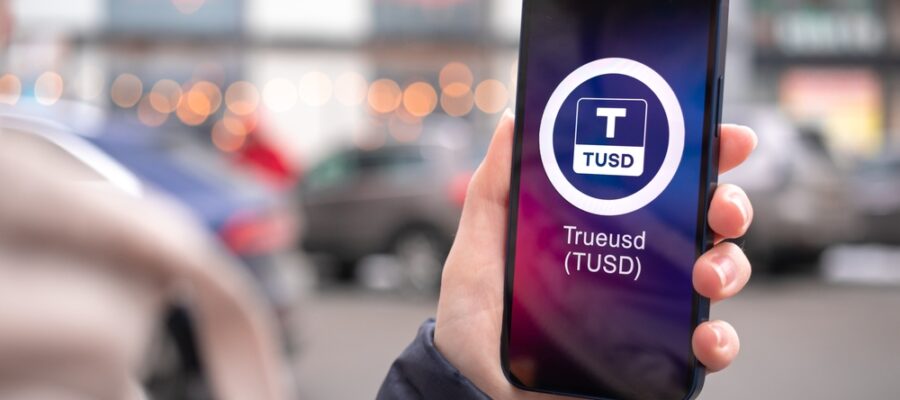TrueCoin LLC and TrustToken Inc. settle SEC charges involving fraudulent and unregistered sales of TrueUSD-linked investment contracts.
The US Securities and Exchange Commission (SEC) confirmed in a Tuesday, Sept. 24 announcement charging TrueCoin LLC and TrustToken Inc. The securities watchdog claimed the pair was behind the TrueUSD (TUSD) stablecoin, which the agency classifies as a fraudulent scheme involving unregistered sales of investment contracts.
The Gary Gensler-led regulator termed TrueUSD the purported stablecoin and sued the firms behind the misleading marketing claims, assuring safety and backing the dollar-pegged crypto. The Tuesday update by SEC reveals the duo settled the charges with $700,000 penalties, although neither admitted nor denied the allegations.
TrueUSD Backers Settle Charges
Acting head of crypto assets and cyber unit at the SEC, Jorge Tenreiro, revealed that TrustToken and TrueCoin prioritised profits. As such, they exposed investors to aggravated and undisclosed risks via misrepresentations of the investment safety.
Tenreiro considers the TrueUSD case to be prime grounds for registration. The enforcement executive decried that product investors are repeatedly deprived of crucial information to make informed decisions.
The disclosure shows TrueCoin and TrustToken were at fault for falsely representing TUSD’s backing. The firms allocated a significant portion of TUSD reserves backing TUSD to an offshore investment fund that the SEC labels as speculative and risky.
The official statement by the SEC that both defendants were privy to the redemption issues facing the offshore fund. Nonetheless, they failed to halt pumping the TUSD’s backing into the opportunity. While the investment fund is anonymous in the agency’s complaint, the allocation was destined for a trade finance and related venture.
The Commission indicates that both TrueCoin and TrustToken claimed they had the stablecoin fully backed by the US dollars. Shockingly, the complaint shows 99% of the backing was at a point in September in the offshore fund.
The concerns raised in the complaint surfaced in June when investors’ confidence in the TUSD stablecoin waned. Consequently, the TUSD value plunged to 80 cents on the Binance US exchange.
The 20% slip in TUSD value emerged after the Prime Trust collapse – the TUSD custodian. The TrueUSD’s X (formerly Twitter) account responded by showcasing the trading volume surge using the hashtag #TUSDKeepGrowing.
TUSD had rising prominence when leading crypto exchange Binance initiated zero-fee trading on pairs with the TUSD. The TUSD market value peaked in October last year at $3.8 billion, per CoinGecko data. The market value has declined 86%, hovering below $500 million.
Worse still, Binance revised the zero-fee offering in July this year, limiting the coverage to TUSD-Tether (USDT) trades. The TUSD stablecoin attracts huge activity in WhiteBIT, with the TUSD/USDT pair attaining $1,842,901 in 24-hour trade volume.
SEC Leads Scrutiny into Dollar-Pegged Stablecoin
The stablecoin segment has attracted scrutiny from regulators, echoing the Federal Reserve officials’ stance to have stablecoins regulated similarly to bank deposits and money market mutual funds, and the SEC appeared to back such a proposal by convincing the court that Terraform Labs offered the defunct TerraUSD to investors as a security.
Last year, a New York federal judge ruled that TerrasUSD (UST) stablecoin is a security. The observation extended to the sister coin LUNA. The UST would maintain its dollar peg via trading incentives, only for the algorithmic stablecoin to fall apart.
Terraform Labs and its founder, Do Kwon, would later emerge liable for civil fraud charges. The SEC detailed the duo’s arrangements with third parties purchasing UST on the open market when it slipped from its peg, thereby falsely restoring confidence.
The SEC extended the investigations into other stablecoin issuers, claiming the New York-based Paxos as a victim for its Binance-branded BUSD. Paxos indicated in July this year that the SEC dropped the scrutiny without legal action.
The SEC indicates that theTrueUSD’s website illustrates that investors can access the real-time reserve from the balance dashboard, which shows the stablecoin backed by $502 million in escrowed collateral. The agency refutes the attestations as merely false assurances.
TrueUSD has recently addressed popular myths and misunderstandings, terming them falsehoods in the blog post. The company outlines the safety of the stablecoins, likening them to cash. The post urges one to consider the col-lateralisation mechanism deployed, issuer credibility and audit frequency.
Editorial credit: FellowNeko / Shutterstock.com
Explore the future of crypto investments with Finance Phantom Bot – an AI robot programmed for profitable trades.
All trademarks, logos, and images displayed on this site belong to their respective owners and have been utilized under the Fair Use Act. The materials on this site should not be interpreted as financial advice. When we incorporate content from other sites, we ensure each author receives proper attribution by providing a link to the original content. This site might maintain financial affiliations with a selection of the brands and firms mentioned herein. As a result, we may receive compensation if our readers opt to click on these links within our content and subsequently register for the products or services on offer. However, we neither represent nor endorse these services, brands, or companies. Therefore, any disputes that may arise with the mentioned brands or companies need to be directly addressed with the respective parties involved. We urge our readers to exercise their own judgement when clicking on links within our content and ultimately signing up for any products or services. The responsibility lies solely with them. Please read our full disclaimer and terms of use policy here.

